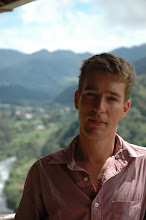Poverty and Tourism
Poverty is endemic in West Africa, but it doesn't manifest itself quite in the way I had imagined. Instinctively I had an urban image of poverty in my mind, a picture of fetid shanty towns with open sewers and appalling air quality. No doubt such places exist here, in overcrowded cities such as Lagos, but its not the form in which I have encountered it on this trip. In fact West Africa can fool you. There is an impression of abundance here when you visit the lively and colourful markets. Houses are extremely modest but on the whole but do look permanent. Children are very neatly turned out in their school uniforms and it is noticeable how well dressed West African folk tend to be - I regularly find myself in situations where I feel myself to be inapporpriately scruffy in my travelling rags.
When you scratch a bit deeper though the problems emerge. Many people have several jobs and live a long way from their homes. A taxi driver I spoke to hadn't been able to get home to see his wife and kids in three months. Basic facilities such as piped water are not available in many places. The pharmacies may be well stocked but most people can't afford the medicines, hence the terrible plight of Aids sufferers over here. The reason you see so many people lolling around in the shade of their verandahs at all times of the day is because there are problems of massive unemployment throughout the region. The guys I talked to in Lome said that everyone in Togo was a craftsman because that was the only way you could make money. Governments regularly fail to pay wages to government employees, sometimes for months on end, a situation which explains the prevalence of corruption and a culture of bribes in so many of the region's police forces. Some countries do seem to be fairing better than others with Benin and Ghana relatively prosperous compared to Nigeria and Togo, and with Cameroon very much on the slide and in danger of freefall.
All of which can put you in an uncomfortable position as a tourist. White is assumed to mean wealthy and the request for 'cadeau', usually quite politely made, is relentless and at times insistent. Certain more touristy spots including the better known african crafts markets become places where you have to exhibit steely resolve to make it through without shouting at someone. If you go with the flow and adopt a local guide/protector it can be a lot of fun, but alone you are besieged.
However the aspect of being a tourist I've felt most uncomfortable about is the visits to culturally interesting communities. The coasts of Benin and Togo, for example, are unusual in that behind a virtually unbroken coastline of coconut palm fringed sandy beaches, there stretches a vast area of fresh water lagoons inhabited by large fishing communities living in stilt villages. You can take trips out to visit these villages in dug out canoe boats called pirogues which punt lazily across the water, occasionally raising a flimsy sail to take advantage of a warm gust of wind. The boatmen make a good living from the tourist trade. The local communities whose picturesque villages are the focus of all our camera lens may well not do so. The distribution of income isn't entirely clear, but as a sensitive tourist it is easy to feel rather exploitative floating around a place where, however nice the views, the people are obviously scratching out a living in highly insanitory conditions. It's a real African problem, and in a part of Africa where much of the tourist interest is focused around the traditions and cultures of the people, its a problem that you cannot avoid thinking about.


0 Comments:
Post a Comment
Subscribe to Post Comments [Atom]
<< Home